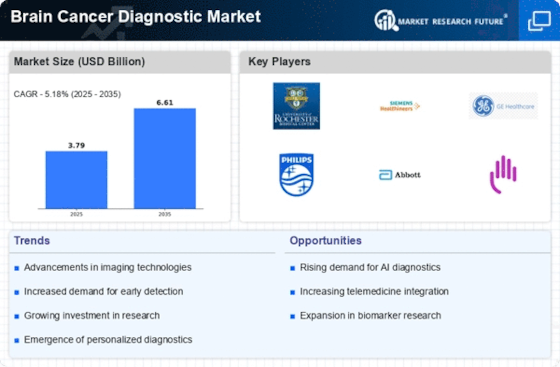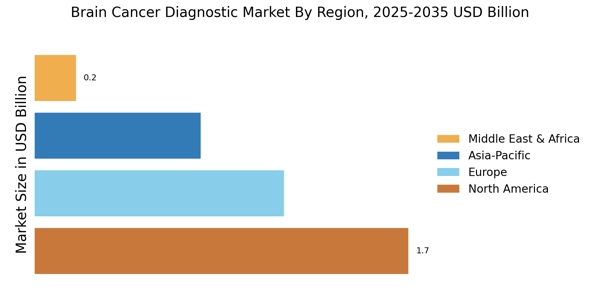Government Initiatives and Funding
Government initiatives aimed at cancer research and funding are crucial drivers for the Brain Cancer Diagnostic Market. Various health organizations and governmental bodies are allocating substantial resources to enhance cancer research, which includes the development of advanced diagnostic tools. For instance, funding for brain cancer research has seen a notable increase, with several countries prioritizing this area in their health agendas. Such initiatives not only foster innovation but also encourage collaboration between public and private sectors, leading to the emergence of novel diagnostic solutions. The Brain Cancer Diagnostic Market stands to benefit from these investments, as they facilitate the introduction of new technologies and methodologies that can improve diagnostic accuracy and patient outcomes.
Growing Demand for Early Diagnosis
The increasing emphasis on early diagnosis of brain cancer is a significant driver for the Brain Cancer Diagnostic Market. Early detection is critical for improving treatment efficacy and survival rates, prompting healthcare providers to seek advanced diagnostic solutions. As awareness of brain cancer symptoms rises, patients are more likely to seek medical attention sooner, thereby increasing the demand for diagnostic services. This trend is reflected in the market, where the demand for non-invasive and accurate diagnostic tests is on the rise. The Brain Cancer Diagnostic Market is expected to expand as healthcare systems adapt to meet this growing need, focusing on technologies that facilitate early and precise diagnosis.
Increasing Incidence of Brain Cancer
The rising incidence of brain cancer is a pivotal driver for the Brain Cancer Diagnostic Market. According to recent statistics, brain cancer cases have shown a steady increase, with an estimated annual growth rate of approximately 2.5%. This trend necessitates enhanced diagnostic capabilities to facilitate early detection and treatment. As the population ages, the prevalence of brain tumors is expected to rise, further amplifying the demand for advanced diagnostic tools. The Brain Cancer Diagnostic Market is thus positioned to expand significantly, as healthcare providers seek innovative solutions to address this growing health concern. The urgency for effective diagnostic methods is underscored by the need for timely interventions, which can potentially improve patient outcomes and survival rates.
Advancements in Diagnostic Technologies
Technological innovations in diagnostic imaging and testing methodologies are transforming the Brain Cancer Diagnostic Market. The advent of high-resolution imaging techniques, such as MRI and PET scans, has significantly enhanced the accuracy of brain cancer diagnoses. Furthermore, the integration of molecular diagnostics and biomarker identification is paving the way for personalized medicine approaches. These advancements not only improve diagnostic precision but also facilitate the development of targeted therapies. The Brain Cancer Diagnostic Market is likely to witness substantial growth as healthcare institutions adopt these cutting-edge technologies to enhance patient care. The continuous evolution of diagnostic tools is expected to drive market expansion, as stakeholders strive to keep pace with the increasing complexity of brain cancer cases.
Rising Investment in Healthcare Infrastructure
The surge in investment in healthcare infrastructure is a vital driver for the Brain Cancer Diagnostic Market. Many regions are enhancing their healthcare facilities to accommodate advanced diagnostic technologies, which is essential for effective brain cancer management. This investment includes the establishment of specialized cancer centers equipped with state-of-the-art diagnostic tools. As healthcare systems evolve, the demand for comprehensive diagnostic services is likely to increase, thereby propelling the growth of the Brain Cancer Diagnostic Market. Enhanced infrastructure not only improves access to diagnostic services but also fosters research and development, leading to innovative solutions that can address the complexities of brain cancer diagnosis.

















